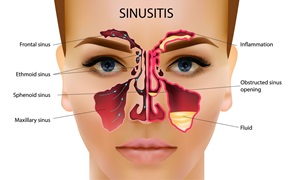Diseases

Sinusitis
Sinusitis, commonly referred to as a sinus infection, is a condition characterized by inflammation or swelling of the sinuses, which are the air-filled cavities located in the bones around the nose and eyes. Sinusitis can be acute (short-term) or chronic (lasting longer than 12 weeks) and can have various causes, including viral or bacterial infections, allergies, and structural issues in the nasal passages. Ayurveda offers holistic approaches to managing sinusitis by addressing underlying imbalances and providing relief from symptoms. Here's how Ayurveda views and manages sinusitis:
1. **Dosha Imbalance:** Ayurveda recognizes that sinusitis can be related to imbalances in the doshas, particularly Kapha and Vata:
- **Kapha Imbalance:** Excess Kapha dosha, which is characterized by qualities of heaviness, coldness, and mucus production, can lead to the congestion and blockage of the sinuses.
- **Vata Imbalance:** Vata dosha, when aggravated, can cause dryness and inflammation in the nasal passages, potentially contributing to sinusitis.
2. **Dietary Modifications:** Ayurvedic dietary recommendations for sinusitis aim to balance the doshas and reduce inflammation:
- **Kapha-Pacifying Diet:** Favor warm, light, and easily digestible foods. Minimize dairy, cold or frozen foods, and sweets, which can aggravate Kapha.
- **Spices:** Incorporate spices like ginger, black pepper, and turmeric, which have anti-inflammatory properties and can help alleviate congestion.
- **Hydration:** Stay well-hydrated with warm fluids like herbal teas and warm water to help liquify mucus.
3. **Nasal Cleansing (Neti):** Nasal irrigation with a saline solution (using a Neti pot) can help clear mucus, allergens, and irritants from the nasal passages. This practice can be especially beneficial for those with sinusitis related to allergies.
4. **Herbal Remedies:** Ayurveda offers various herbal remedies to manage sinusitis symptoms and balance doshas:
- **Triphala:** A combination of three fruits with cleansing properties that can help reduce congestion.
- **Guduchi (Tinospora cordifolia):** Known for its immune-boosting and anti-inflammatory effects.
- **Trikatu:** A blend of three pungent spices (ginger, black pepper, and long pepper) that can help stimulate digestion and reduce congestion.
5. **Steam Inhalation:** Inhaling steam infused with herbs like eucalyptus, mint, or chamomile can provide relief from sinus congestion and soothe irritated nasal passages.
6. **Lifestyle Modifications:** Ayurveda emphasizes the importance of maintaining a balanced daily routine (dinacharya) and adequate sleep to support overall health and immune function.
7. **Stress Management:** Stress can exacerbate sinusitis symptoms. Ayurveda recommends stress-reduction practices such as yoga, meditation, and pranayama (breathing exercises).
8. **Consultation:** It's essential to consult with an Ayurvedic practitioner for personalized recommendations, especially if you have chronic or recurrent sinusitis. They can assess your dosha constitution and provide specific guidance tailored to your needs.
Ayurvedic approaches can be used alongside conventional medical treatments for sinusitis. Always consult with your healthcare provider before making significant changes to your treatment plan, especially if you have severe or chronic sinusitis. Ayurveda aims to address the root causes of sinusitis and promote long-term relief and well-being.
